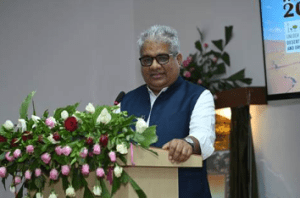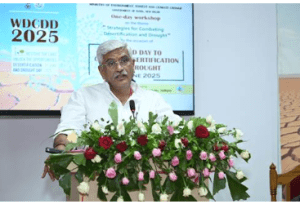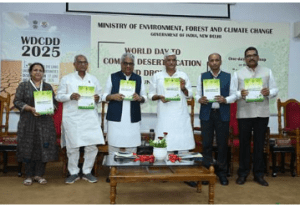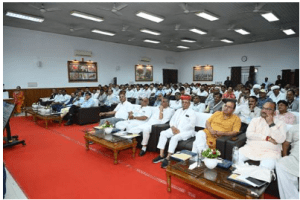Jodhpur, June 17, 2025 – On the occasion of the World Day to Combat Desertification and Drought, the Ministry of Environment, Forest and Climate Change (MoEFCC), Government of India, organized a significant one-day national workshop at the Arid Forest Research Institute (AFRI), Jodhpur, under the theme “Strategies for Combating Desertification and Drought.” The workshop brought together key stakeholders, scientists, policymakers, and community leaders to deliberate on sustainable land management in arid and semi-arid regions of India.
 The event was inaugurated by Union Environment Minister Shri Bhupender Yadav, who was joined by Union Minister for Culture and Tourism Shri Gajendra Singh Shekhawat, and Member of Parliament Shri Rajendra Gehlot. In his keynote address, Shri Yadav emphasized India’s proactive approach to combat land degradation through integrated ecological restoration, community involvement, and sustainable agricultural practices.
The event was inaugurated by Union Environment Minister Shri Bhupender Yadav, who was joined by Union Minister for Culture and Tourism Shri Gajendra Singh Shekhawat, and Member of Parliament Shri Rajendra Gehlot. In his keynote address, Shri Yadav emphasized India’s proactive approach to combat land degradation through integrated ecological restoration, community involvement, and sustainable agricultural practices.
“Restore the Aravallis, Revive the Nation”
Shri Yadav made an impassioned plea for community-led restoration of the Aravalli hills, which he termed a natural bulwark against desertification. Spanning 700 km and covering 29 districts, the Aravalli range holds immense ecological, hydrological, and cultural significance. “The Aravallis are the lungs of this region and the first line of defense against the Thar Desert’s expansion,” he noted.


-
Amrit Sarovars – Rejuvenating water bodies for drought resilience
-
Matri Van – Planting trees in memory of one’s mother to foster emotional and environmental connection
-
Ek Ped Maa Ke Naam – PM Narendra Modi’s initiative encouraging every citizen to plant a tree in tribute to ‘Mother Earth’
“These aren’t mere plantation drives,” Shri Yadav stressed. “They’re symbols of responsibility toward our planet and future generations.”
Significant Contributions from Culture and Tourism Ministry
Shri Gajendra Singh Shekhawat lauded the timing of the workshop and reiterated the importance of India’s forest cover in contrast to global deforestation trends. “Despite a global decline, India is among the few countries registering a consistent rise in forest cover,” he said.


Workshop Highlights and Releases
The event featured the release of several important publications, including:
-
Information Booklet on Aravalli Districts
-
Revised Mission Document of the Green India Mission
-
Book on Sustainable Land Management
-
Launch of National Afforestation Monitoring System (NAMS)
In a symbolic gesture, AFRI Shesham Clones were distributed to ten farmers to encourage local afforestation.
Technical sessions during the workshop included global and national case studies on Sustainable Land Management (SLM), featuring input from international development partners such as UNDP, ADB, KfW, AFD, and the World Bank. A dedicated session on the Aravalli Green Wall Project showcased inter-state cooperation to restore this critical landscape.
The final discussion focused on Land Degradation Neutrality (LDN) and featured stakeholders from government departments, scientific agencies (like SAC and CAZRI), and NGOs to align India’s strategy with the UN Convention to Combat Desertification (UNCCD).
India’s Vision: Land Restoration for a Green Economy
Looking ahead to India’s centenary of independence in 2047, Shri Bhupender Yadav reiterated the government’s resolve to integrate ecological preservation with economic progress. “A thriving green economy is not just a goal but a necessity for a resilient and sustainable India,” he said.


Conclusion
The workshop at AFRI, Jodhpur, marked a significant milestone in India’s environmental governance. With strategic insights, collaborative frameworks, and deep-rooted community action, the nation is making strong strides in combating desertification and building climate-resilient ecosystems.
The event stands as a reminder that restoring nature is not just about planting trees but reviving the very fabric of life, culture, and sustainability — a message India is echoing to the world.
For more details, check press release on PIB website.
For more real-time updates, visit Channel 6 Network.

